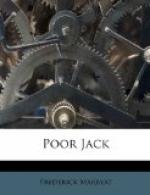The return of my father made some alteration in our mode of life. He might, if he had pleased, have lived as an out-pensioner with my mother; but this he would not do. He used to come in almost every evening to see her, and she used to provide for him a pot of porter, which he seldom exceeded. If he had friends with him, they paid for what they drank. This pot of porter per diem was the only demand made upon my mother for permission to remain separate, and she did not grumble at it. His tobacco he found himself out of the tobacco money allowed at the hospital. He had received some pay, which, contrary to his former custom, he had laid by in the charge of one of the lieutenants of the hospital, for at that time there were no savings banks.
As a married man my father had the liberty to introduce his wife and children into the hospital at meal-times, to share his allowance with them. This my mother would not listen to, as regarded herself and my sister; but my father messed in what is called the married men’s room, on my account, and instead of buying my own dinner, or applying to my mother for it, I now always took it with my father in the hospital. In consequence of my father’s admittance as a pensioner, both I and my sister might have been instructed at the hospital school; but my mother would not premit Virginia to go there, and I found it much more convenient to go to Peter Anderson in the evening, when I had nothing to do. On the whole, we all went on much more comfortably than we did before my father’s return.
One evening I was, as usual, with Anderson in his cabin; my father having been drafted into his ward, I could not help asking Anderson how he liked him. His reply was, “I like your father, Jack, for he is a straightforward, honest, good-tempered man, and, moreover, has a good natural judgment. I think it a great pity that such a man as he is should be so early in life lost, as it were, to the country. He is a first-rate seaman; and although there are many like him, still there are none to spare. However, if his country loses, he may himself gain, by being so soon called away from a service of great temptation. The sailor who has fought for his country, Jack, has much to be thankful for when he takes in moorings at Greenwich Hospital. He is well fed, well clothed, tended in sickness, and buried with respect; but all these are nothing compared with the greatest boon. When I reflect what lives sailors live, how reckless they are, how often they have been on the brink of eternity, and wonderfully preserved, without even a feeling of gratitude to Him who has watched over them, or taking their escapes as warnings; when I consider how they pass their whole lives in excess, intemperance, and, too often, blasphemy, it is indeed a mercy that they are allowed to repose here after such a venturous and careless career; that they have time to reflect upon what has passed, to listen to the words of the Gospel, to hate their former life, and trusting in God’s mercy to secure their salvation. This is the greatest charity of this institution, and long may it flourish, a blessing to the country which has endowed it, and to the seamen, who are not only provided for in this world, but are prepared in it for the next.”




